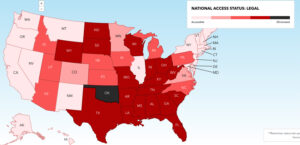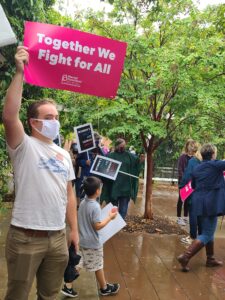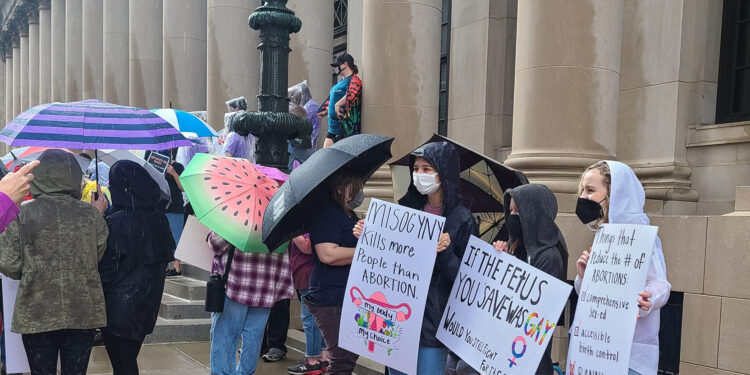WASHINGTON – For nearly 50 years, abortions have been legal and accessible but not without controversy. Now, the U.S. Supreme Court has decided to overturn the nation’s precedential law that made the procedure legal regarding a Mississippi case called Dobbs v. Jackson Women’s Health Organization, a direct challenge to Roe v. Wade that was decided in 1973.
The current case in question results from a doctor at the Jackson Women’s Health Organization (abortion clinic) challenging the Mississippi Gestational Age Act. The Act provides that “except in a medical emergency or the case of a severe fetal abnormality, a person shall not intentionally or knowingly perform or induce an abortion of an unborn human” if that gestational age is greater than 15 weeks.
The court cited past cases ruling on the definition of privacy. In Roe v. Wade, a 7-2 decision written by Justice Harry Blackmun ruled the Texas statute violated Jane Roe’s (alias) constitutional right to privacy. It also upheld the Constitution’s First, Fourth, Ninth, and Fourteenth Amendments to protect an individual’s “zone of privacy” against state laws. Marriage, contraception, and childbearing are covered in this “zone of privacy.”
The Supreme Court recently threw out a Texas law that placed difficult requirements upon abortion providers in 2016. The 1973 ruling provided access to legal abortions on the federal level, preventing many deaths from unsafe and illegal abortions. Another case, Planned Parenthood v. Casey, a 1992 case, reaffirmed that decision stating that abortion restrictions cannot place an “undue burden.”
Fast forward to 2022, the bench of the U.S. Supreme Court turns over Roe vs. Wade. Five justices were firmly in favor, including Samuel Alito, Clarence Thomas, Neil Gorsuch, Brett Kavanaugh, and Amy Coney Barrett.
Chief Justice John Roberts wrote a separate opinion saying he supported the Mississippi ban but would not comment any further.
The three justices who disagreed with the majority – Stephen Breyer, Sonia Sotomayor and Elena Kagan – wrote that they had done so- “with sorrow – for this court, but more, for the many millions of American women who have today lost a fundamental constitutional protection.”
The decision allows States to take responsibility for managing the controversial topic, with 13 already enacting “trigger laws” that restrict and immediately outlaw abortion in said state. Still, at least 16 states and Washington D.C. are planning to continue to protect abortion rights on the state level.
These states that have not outlawed the procedure are working on expanding policy and funding toward the matter while looking for accessibility for out-of-state traveling patients seeking abortions. Laws are being implemented state by state, allowing protection for patients and providers. Laws vary state by state.

After the Texas abortion ban, Planned Parenthood said its clinics in neighboring states saw an 800% increase in abortion patients in just four months.
The organization projects that 26 states will likely move to ban abortion quickly. That means 36 million women, nearly half of the women of reproductive age (between 18 and 49) in the United States, would lose abortion access.
Data provided by Planned Parenthood also stated that the ban would significantly affect low-income people and minorities.
A recent Washington Post-ABC poll found that 75% of people say decisions on abortion should be left to the woman and her doctor, including 95% of Democrats, 81% of independents, and 53% of Republicans.
ON THE RESERVATION: IN Oklahoma
In Oklahoma, the governor signed a bill that enacted what is said to be the most restrictive abortion bill in the country, immediately halting surgical and medical abortion procedures on May 25.
The bill bars abortion after fertilization, only allowing exceptions for immediate physical emergencies or in reported cases of rape or incest that caused gestation.
Alexis McGill-Johnson, the President and C.E.O. of Planned Parenthood Federation of America, said that Oklahoma would be the first state in the country to outlaw abortion entirely.
Oklahoma’s House of Representatives approved the measure by a vote of 73-16.
According to the bill, abortion “does not include the use, prescription, administration, procuring, or selling of Plan B, morning-after pills, or any other type of contraception or emergency contraception.”
House Bill 4327 was signed into action by the OK governor Kevin Stitt, claiming he is keeping his promise to the Oklahoman’s to sign every piece of pro-life legislation as governor of the state.

“From the moment life begins at conception is when we have a responsibility as human beings to do everything we can to protect that baby’s life and the life of the mother,” Stitt stated.
Fertilization can happen anytime, from the first few hours to five days. Physical symptoms may occur at around three to four weeks, while others can reach months before realizing pregnancy with little to no symptoms. More often than not, women can be well past the six-week mark before pregnancy signs occur. Some even still have a menstruation cycle.
On another note, civil cases can be enacted under the said bill. A citizen can sue another for performing or assisting in performing an abortion for up to $10,000.
Before 4327, the state had pushed the Senate Bill 1503 Six Week Abortion (A.K.A. Oklahoma Heartbeat Act) on May 3. It stated that a heartbeat could be detected at or around six weeks gestation, at which point a physician could face civil lawsuits.
Oklahoma Legislature signed the 612 Total Abortion Ban on April 12, but it was not to take effect until August. This bill made it a felony to perform abortions. Doctors who perform abortions face up to 10 years in prison and up to $100,000 in fines.
Ultimately, the House Bill enacted on May 25 is more or less a combination of the two Senate Bills with some tweaks resulting in a somewhat replicated Texas-style abortion bill.
According to the Planned Parenthood website, the organization has immediately suspended abortion procedures in OK as of May 25. However, information, resources, and services can be provided. The organization claims to contest the bill by amending a challenge filed against S.B. 1503 on April 29.
GOVERNOR USING ABORTION CONFLICT AS A SOVEREIGNTY WEAPON
Now that states have the authority to implement their abortion laws, Governor Kevin Stitt warned tribes against allowing abortion clinics inside the tribe’s jurisdiction.
The Cherokee Nation replied to Stitt’s warning as an attack on tribal sovereignty.
The Muscogee Nation said in a short statement to Mvskoke Media that the funds used in the clinics in hospitals are from the federal government, which does not include abortions.
Tribal healthcare systems have never been abortion providers or supporters, which is a direct result of the Hyde Amendment that excluded abortions from the funds tribes receive for medical care.
In the 1977 government-spending bill, it was Rep. Henry Hyde who inserted a sentence that would determine whether communities receiving government funding for healthcare — mostly low-income – would be able to have accessible abortions.
“None of the funds contained in this Act shall be used to perform abortions except where the life of the mother would be endangered if the fetus were carried to term.”
It would require private funding for tribes to provide abortions if they could afford it. So far, no tribes in Oklahoma have indicated that they would be open to allowing abortion clinics on their lands.
The relationship between the tribes, state, and federal government remains complicated with the landmark McGirt decision, which gave tribes their jurisdictional authority as sovereign entities in criminal cases. The decision has unfolded layers and layers of state and federal government propaganda.
The Supreme Court’s decision in the Oklahoma v. Castro-Huerta case makes the topic even more complicated, where the state is granted the power to prosecute non-Natives who commit certain crimes against Natives on reservations. That means a non-Native provider performing an abortion for a Native person on tribal land could be penalized.
FROM THE PRESIDENT
President Joe Biden immediately denounced the ruling by welcoming women to travel to states where abortion is allowed.
At a news conference in Europe, he announced his support for codifying legislation for abortion access, including ensuring privacy protections. He claimed that the court’s ruling was “outrageous,” a “mistake,” and “destabilizing.”
Even though Biden was an original supporter of the Hyde movement, his outlook on the topic has changed as his role has developed since 1973 when he was first sworn into the Senate; the same year, Roe v. Wade was decided.
The Biden administration set up a website, https://reproductiverights.gov/, to help people navigate the complex topic.





